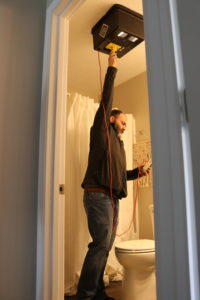Mechanical ventilation is crucial in today’s modern homes. It can improve your home’s indoor air quality by circulating fresh air while controlling moisture, diluting pollutants, and preventing inadequate airflow. Mechanical ventilation doesn’t require someone to be home to open the windows either. Without mechanical ventilation, you will find that odors and pollutants will build up. It’s important to recognize when you have airflow issues and what to do. If you suspect your mechanical ventilation system is failing, contact Energy Diagnostics Inc., for assistance.
How Mechanical Ventilation Systems Work
Numerous mechanical ventilation systems are on the market. You should choose one based on your local climate as well as your home’s heating and cooling system. No matter which system you choose, you should consider spot fans for your kitchen and bathroom as these rooms receive concentrated odors and moisture.
There are three main types of systems that are ideal for different climates. These systems are:
- Supply Ventilation Systems: These systems work best in either hot or mixed climates. They work by drawing in fresh air through intake vents and distribute it to multiple rooms using a fan and duct system.
- Balanced Ventilation Systems: These can work in all climate types. They work by bringing in and sending out equal quantities of air. Many systems use two fans, one to draw in the air and one to remove the indoor air. Two of the most commonly used systems are the energy recovery ventilation system (ERV) and the heat recovery ventilation system (HRV).
- Exhaust Ventilation Systems: Exhaust ventilation systems are best for colder climates. They work by continuously exhausting indoor air to the outdoors through one or more fans typically located in the home’s bathrooms. The house becomes slightly depressurized from the constantly flowing air, which makes it bad for hot or humid climates. There is a risk of drawing outdoor air that is hot into the remaining cracks and holes. If the hot air reaches the home’s cooler interior surfaces, it can condense and lead to moisture problems.

Benefits of Mechanical Ventilation
- Better Indoor Air Quality: Sometimes indoor air can be more polluted than outdoors. Considering many people spend the majority of their day inside, it’s concerning. By removing moisture that causes mold, allergens, and other pollutants, you will find your home’s air quality increases.
- You Have More Control: A mechanical ventilation system gives you more control over the air coming into the house. When you rely on airflow through your roof, windows, and walls, you lack control over the source and amount of air. The air could be coming from contaminated places, such as the attic or garage. Your system will give you proper fresh air control with suitable locations for intake and exhaust vents.
- Added Comfort: These systems provide a constant flow of outside air into your home. They can also provide dehumidification, filtration, and conditioning of the outside air.
Common Home Ventilation Issues
If you aren’t familiar with some of the most common home ventilation issues, you may not understand the need for a mechanical ventilation system. Indoor pollutants are a significant problem. Poor air quality is a health hazard for homes. Common household items like plastics and paints emit particulates called volatile organic compounds, or VOCs. In small amounts, they are not harmful. However, without the proper ventilation in your home, they can create respiratory issues, including conditions prime for mold to grow.
Another potential problem is when negative pressure accumulates. Homes that are too airtight can have air drawn into gaps, crevices, and other spots not intended for the air to flow.
Signs of Air Quality Problems
Learning to identify signs of poor air quality in your home is important. These problems may indicate that you need to install a mechanical ventilation system or that your current one may need servicing. The four main issues you should be watching out for include inadequate air exchange, too much air exchange, excess moisture, and excess filtration.
Inadequate Air Exchange
One way to spot inadequate ventilation is the presence of odors. How often do you smell them? In what part of the house do you smell them? Odors that persist for hours may mean the source is continuing to release the chemical or the air carrying these odors has no quick and controlled way to exit the house.
Too Much Air Exchange
Too much air exchange can be an issue, especially for those people who live in dry climates. If you find the inside of the house uncomfortably dry, check your ventilation system’s fan speed. Then, consider buying a humidifier if you need one. In humid and hot climates, ventilation rates that are too high can increase your indoor humidity beyond what your air conditioning unit can handle. You may need supplemental dehumidification in some instances.
Excess Moisture
Recognizing excess moisture is often a pretty simple one to diagnose. If you see mold, condensation, or excessive ice building up, you have a moisture problem.
Excess Filtration
Excess filtration can be when you feel a draft, especially during winter months and when you are close to exterior walls. Watch for “ghost tracks” of dark dust near any poorly sealed areas, especially on light carpets near your exterior walls, or black edges on your attic fiberglass insulation batts. Another sign that is less obvious is frequent static electricity discharges during winter months when your indoor humidity levels are not high enough.
Solving Ventilation Problems
You can start by opening your windows for at least 15 minutes per day to help relieve negative pressure and reduce indoor air pollutants. You need to open two windows to facilitate airflow so one acts as an exhaust and one as an intake vent.
Next, you should contact an expert in the field to test your insulation and ventilation system. At Energy Diagnostics, we have been in business for nearly 30 years and have received numerous awards and accolades. We have trained contractors, builders, and code officials in multiple states on International Energy Conservation Code (IECC). If you require assistance with your ventilation system or need to have one installed, let our skilled team assist you.
